Top 70 Accounting Assistant Interview Questions and Answers
Preparing for an Accounting Assistant Interview? It requires more than just technical knowledge; it demands strong problem-solving skills, attention to detail, and the ability to work under pressure. During interviews, employers look for candidates who can demonstrate not only their understanding of accounting principles but also their ability to apply them in real-world scenarios. This guide brings together 70 Accounting Assistant interview questions and answers to help you prepare with confidence.

What is an Accounting Assistant
An Accounting Assistant is a key support professional within the finance department who works closely with accountants, auditors, and managers to keep financial operations running smoothly. Their primary responsibilities include tasks such as bookkeeping, entering and verifying data, processing invoices, reconciling bank statements, managing accounts payable and receivable, and assisting in the preparation of financial reports. They play an important role in ensuring compliance with accounting standards, maintaining accurate records, and spotting discrepancies that could affect financial integrity.
70 Must-Know Accounting Assistant Interview Questions
Accounting Assistant Interview Questions for Freshers
- Can you explain the role of an Accounting Assistant?
- What are the basic accounting principles you know?
- How familiar are you with bookkeeping?
- What is the difference between accounts payable and accounts receivable?
- Do you know what a trial balance is?
- How do you define double-entry accounting?
- Which accounting software have you used before?
- What steps would you take to ensure accuracy in data entry?
- Can you explain the difference between cash and accrual accounting?
- Why did you choose accounting as a career path?
Accounting Assistant Interview Questions for Intermediate
- How do you reconcile bank statements?
- What steps do you take to prepare financial reports?
- Can you explain depreciation and its types?
- How do you handle invoice discrepancies?
- What is petty cash, and how is it recorded?
- How would you ensure a timely payment of invoices?
- What are adjusting entries, and why are they important?
- How do you prioritize multiple accounting tasks?
- Can you explain accruals vs. prepayments?
- Have you ever prepared balance sheets or income statements?
Accounting Assistant Interview Questions for Experienced-Level
- How do you manage month-end and year-end closing processes?
- Explain how you would handle an audit.
- What internal controls do you recommend for preventing fraud?
- How do you manage confidential financial data?
- What KPIs do you track for accounting accuracy?
- Can you explain variance analysis?
- How do you ensure compliance with accounting standards?
- Have you trained or supervised junior staff?
- Describe your experience with tax preparation.
- How do you improve efficiency in accounting processes?
Behavioral and Situational Accounting Assistant Interview Questions
- Describe a time when you identified an accounting error.
- How did you handle a difficult vendor regarding payments?
- Tell me about a time you worked under tight deadlines.
- Share an example of when you improved a process in your past role.
- How do you manage stress during financial closing periods?
- Describe a time when you had to work with limited information.
- How do you handle conflicts within a finance team?
- Tell me about a time when you exceeded expectations at work.
- Have you ever disagreed with a supervisor about financial handling? What did you do?
- How do you handle repetitive tasks while staying accurate?
Performance-Based Accounting Assistant Interview Questions
- How many invoices can you process in a day without errors?
- Can you explain your accuracy rate in data entry?
- How do you ensure the timely submission of reports?
- What measures do you take to reduce financial discrepancies?
- Have you ever automated any accounting tasks?
- What’s your approach to handling overdue accounts?
- How do you measure your performance as an Accounting Assistant?
- Can you describe a time you improved team productivity?
- How do you ensure compliance with deadlines?
- What metrics do you track in daily accounting work?
Critical Thinking Accounting Assistant Interview Questions
- How would you detect fraud in accounting records?
- If the trial balance does not match, how would you investigate?
- How would you improve reporting accuracy in a small company?
- What would you do if you noticed recurring invoice errors?
- How do you decide when to escalate an issue to management?
- If given incomplete data, how would you prepare a financial report?
- How would you optimize vendor payment schedules to improve cash flow?
- What would you do if you suspected an employee was misusing company funds?
- How would you decide between leasing vs. buying assets?
- How do you approach risk management in accounting?
Career Growth Accounting Assistant Interview Questions
- Where do you see yourself in 5 years in accounting?
- What certifications are you planning to pursue?
- Are you interested in becoming a CPA or CMA?
- How do you stay updated on accounting standards?
- What motivates you to grow in this career?
- Do you see yourself moving into a managerial role?
- How do you plan to improve your technical accounting skills?
- What professional development courses have you completed?
- How do you balance continuous learning with daily work?
- Why should we invest in your long-term growth?
Accounting Assistant Interview Questions for Freshers
This section of the Accounting Assistant interview questions covers the essential account assistant questions that ensure you, as a fresher, understand the basics of an accounting assistant. The AI Interview Answer Generator can help you create answers that are tailored to any role-specific questions, which helps you land a job opportunity.
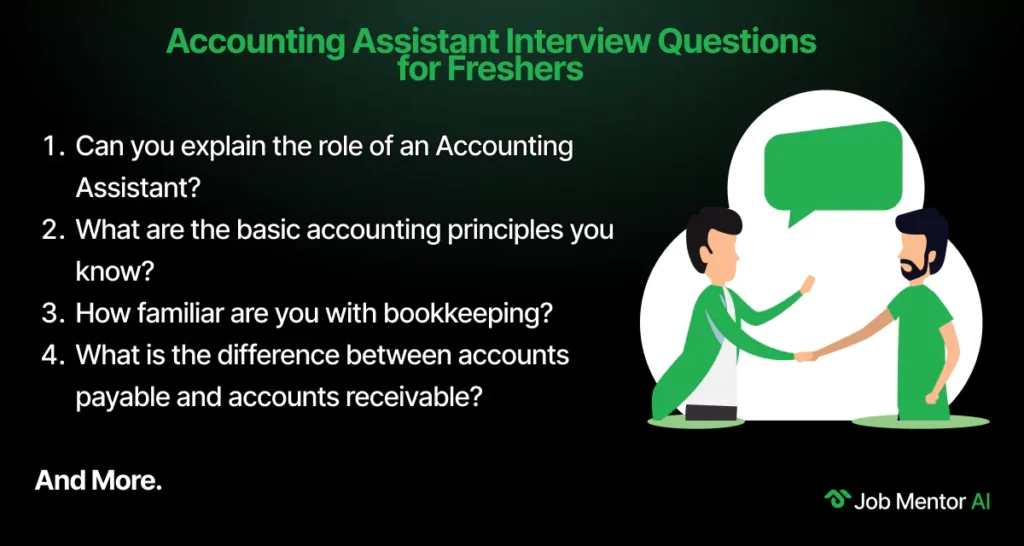
1. Can you explain the role of an Accounting Assistant?
An Accounting Assistant supports the finance department by handling tasks such as data entry, bookkeeping, and preparing financial documents. Their role helps maintain smooth day-to-day financial operations and ensures that accounting processes run efficiently.
2. What are the basic accounting principles you know?
Some basic accounting principles include the accrual principle, which records revenue and expenses when they are earned or incurred; the matching principle, which aligns expenses with related revenues; and the going concern principle, which assumes that a business will continue operating. Other principles include consistency, prudence, and materiality, all of which guide accurate and reliable financial reporting.
3. How familiar are you with bookkeeping?
I am familiar with bookkeeping tasks such as recording daily transactions, maintaining ledgers, and reconciling accounts. I understand the importance of accuracy in tracking expenses, revenues, and payments. Additionally, I can generate basic financial summaries and reports to assist in decision-making and auditing processes.
4. What is the difference between accounts payable and accounts receivable?
Accounts payable refers to the money a company owes to its suppliers or vendors for goods and services received. Accounts receivable, on the other hand, represents money owed to the company by its customers.
5. Do you know what a trial balance is?
A trial balance is a financial report that lists all ledger accounts with their respective debit or credit balances. It is prepared to check the accuracy of the accounting entries and ensure that total debits equal total credits.
6. How do you define double-entry accounting?
Double-entry accounting is a system where every financial transaction affects at least two accounts: one debit and one credit. This system ensures that the accounting equation (Assets = Liabilities + Equity) remains balanced. It provides a complete record of transactions and reduces the likelihood of errors in financial reporting.
7. Which accounting software have you used before?
I have experience using accounting software such as QuickBooks, Tally, and Microsoft Excel for bookkeeping and reporting. These tools help streamline data entry, generate financial statements, and reconcile accounts efficiently. I am also open to learning other software as required by the company.
8. What steps would you take to ensure accuracy in data entry?
To ensure accuracy, I carefully verify source documents before entering data into the system. I double-check figures, use validation tools in accounting software, and reconcile accounts regularly. Maintaining organized records and reviewing entries reduces errors and ensures reliable financial reporting.
9. Can you explain the difference between cash and accrual accounting?
Cash accounting records revenue and expenses only when cash is actually received or paid, providing a simple view of cash flow. Accrual accounting records income and expenses when they are earned or incurred, regardless of cash movement, giving a more accurate picture of financial performance. Understanding both methods helps in proper reporting and decision-making depending on the organization’s needs.
10. Why did you choose accounting as a career path?
I chose accounting because I enjoy working with numbers, analyzing financial data, and ensuring accuracy in records. Accounting offers opportunities to contribute to an organization’s financial health while continuously learning about regulations, reporting standards, and best practices.
Explore More Helpful Resources
Accounting Assistant Interview Questions for Intermediate
This section of Accounting Assistant interview questions will help you prepare for the next stage in your career by highlighting both your technical expertise and your ability to manage everyday challenges in a finance department. For additional assistant, AI Mock Interview Practice can simulate real-life scenarios for you to prepare for an interview.
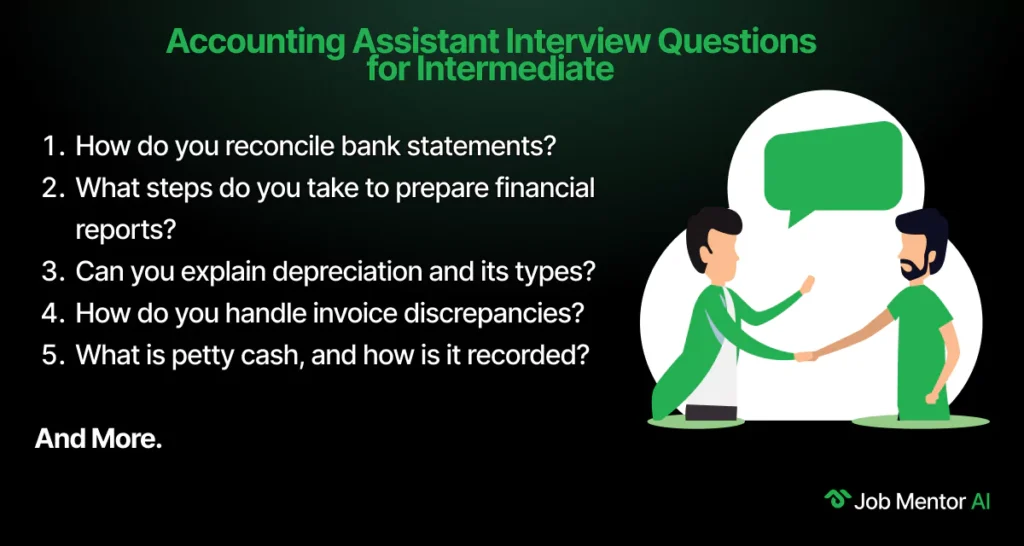
11. How do you reconcile bank statements?
Reconciling bank statements involves carefully comparing the company’s internal cash records with the bank’s statement. I begin by checking opening balances, then verify deposits, withdrawals, bank charges, and interest entries. Outstanding checks and deposits in transit are noted. If discrepancies appear, I trace them back to invoices, receipts, or payment slips until I find the issue. For example, errors often come from timing differences or missing entries. Completing reconciliations on a monthly basis helps detect fraud, ensure accuracy, and maintain reliable financial records.
12. What steps do you take to prepare financial reports?
Preparing financial reports is a multi-step process. I start by gathering all transaction data, ensuring it is properly classified in the ledger. Next, I post adjusting entries for accruals, depreciation, and prepayments. Then I generate a trial balance, which helps confirm that debits and credits are equal. From there, I prepare the balance sheet, income statement, and cash flow statement. Before submission, I review the reports for compliance with accounting standards, accuracy, and consistency with prior periods. Collaboration with the finance team is crucial to validating the data and providing a clear financial picture for management.
13. Can you explain depreciation and its types?
Depreciation is the systematic allocation of the cost of a tangible asset over its useful life, reflecting wear and tear, usage, or obsolescence. The most common methods include straight-line, which spreads the cost evenly across the asset’s life; declining balance, which allocates a higher expense in the earlier years and reduces it over time; and units of production, which bases depreciation on actual usage or output. Choosing the appropriate method depends on the asset type and company policies; for instance, vehicles often use the declining balance method, while buildings typically use a straight-line method.
14. How do you handle invoice discrepancies?
When invoices don’t match purchase orders or delivery receipts, I follow a structured process. First, I cross-check details like item quantities, unit prices, and tax calculations. If I spot a mismatch, I reach out to the vendor to clarify and request corrections if necessary. I document all communications and adjust entries only after proper authorization. For recurring issues, I coordinate with the procurement or operations team to identify root causes. Handling discrepancies carefully avoids overpayments, supports good vendor relations, and ensures financial accuracy.
15. What is petty cash, and how is it recorded?
Petty cash is a small cash reserve kept on hand to cover minor business expenses, such as postage, office supplies, or travel reimbursements. It is recorded by creating a petty cash account in the ledger. Each disbursement is backed by a voucher or receipt, ensuring accountability. Replenishment occurs when the fund runs low, and at that point, expenses are posted to their respective accounts. Maintaining a well-documented petty cash process prevents misuse and ensures compliance with internal controls.
16. How would you ensure a timely payment of invoices?
I keep a clear schedule of due dates using accounting software reminders and calendar alerts. Invoices are reviewed promptly upon receipt to catch errors early. I also monitor cash flow closely to balance outgoing payments with incoming receivables. For critical vendors, I prioritize payments to maintain strong relationships. Communication with suppliers is also important—if delays are unavoidable, I notify them in advance to build trust. Consistent tracking ensures compliance with deadlines and avoids penalties.
17. What are adjusting entries, and why are they important?
Adjusting entries are made at the end of an accounting period to update account balances before financial reports are prepared. Examples include accrued expenses, unearned revenue, prepaid expenses, and depreciation. They are important because they ensure revenues and expenses are recognized in the correct period under the accrual basis of accounting. Without them, reports may show distorted profits or liabilities. Adjusting entries provide a more accurate and fair view of the company’s financial position.
18. How do you prioritize multiple accounting tasks?
I prioritize tasks based on urgency, financial impact, and deadlines. For instance, payroll and tax submissions take precedence because of legal and employee commitments. I use to-do lists, accounting software, and time-blocking to stay organized. I also break larger projects into smaller steps to avoid bottlenecks. Regular communication with supervisors helps ensure that priorities are aligned with organizational goals. By combining planning and flexibility, I can manage workload effectively without compromising accuracy.
19. Can you explain accruals vs. prepayments?
Aspect
Accruals
Prepayments
Definition
Income earned or expenses incurred but not yet recorded
Payments made in advance for goods/services
Recognition
Recorded when earned/incurred, regardless of cash movement
Recorded as an asset until the service or benefit is received
Example
Salaries payable at month-end; unpaid utility bills
Prepaid insurance; advance rent payments
Accounting Treatment
Liability (for expenses) or asset (for revenue) until settled
Initially recorded as an asset, then expensed over the relevant period
Purpose
Ensures expenses/revenue match the correct accounting period
Defers recognition of costs until benefits are received
Impact on Financial Statements
Adjusts the current period’s expenses/revenue
Allocates the cost to future periods for accurate reporting
20. Have you ever prepared balance sheets or income statements?
Yes, I have assisted in preparing both. For a balance sheet, I compiled data from assets, liabilities, and equity accounts. For income statements, I summarized revenues and expenses to calculate net profit. I ensured all entries were accurate by reconciling ledgers and making necessary adjustments. In past roles, I also compared current results with previous periods to analyze performance trends. Preparing these statements has helped me strengthen my technical accounting and reporting skills.
Accounting Assistant Interview Questions for Experienced-Level
This section of Account Assistant interview questions focuses on evaluating your ability to manage complex tasks such as month-end and year-end closings, audits, variance analysis, and compliance with accounting standards. AI Interview Intelligence ensures your preparation stays top-notch by analyzing your interview performance to provide personal feedback.
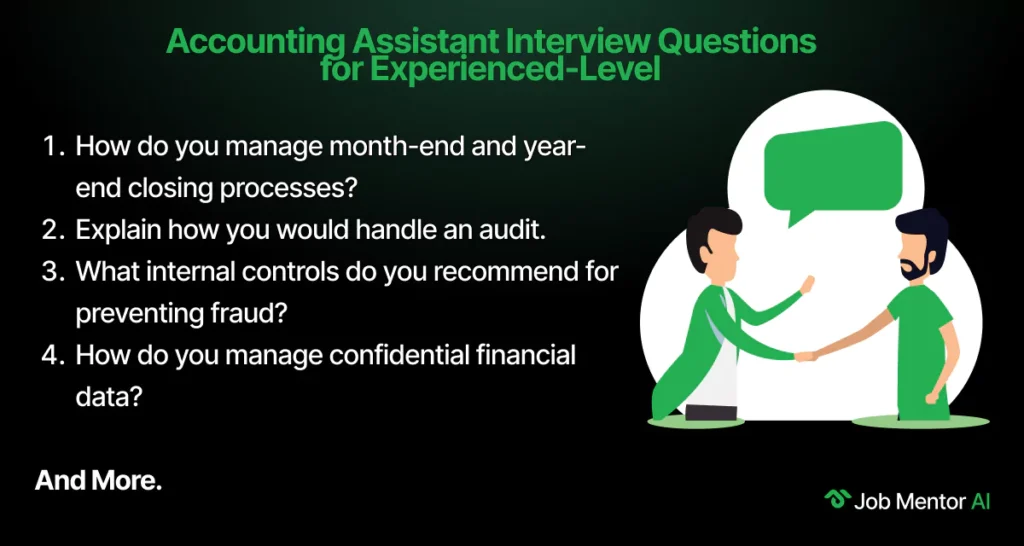
21. How do you manage month-end and year-end closing processes?
Managing month-end and year-end closings requires meticulous planning and coordination. I begin by reconciling all accounts, ensuring that transactions are accurately recorded. I post adjusting entries for accruals, prepayments, and depreciation, and review all outstanding invoices and payments. For year-end closing, I prepare schedules for fixed assets, review tax obligations, and ensure all journal entries comply with accounting standards. Collaboration with auditors and finance managers is key to verifying balances, identifying discrepancies, and finalising financial statements.
22. Explain how you would handle an audit.
During an audit, my approach is to maintain transparency and provide all required documentation promptly. I organize financial statements, general ledgers, reconciliations, and supporting documents so auditors can easily review transactions. Any discrepancies or unusual items are investigated beforehand to prepare explanations. I also coordinate with other departments to gather relevant information. By being proactive, responsive, and detail-oriented, I help auditors complete their review efficiently, while ensuring compliance with statutory regulations and internal policies.
23. What internal controls do you recommend for preventing fraud?
To prevent fraud, I recommend strong internal controls such as segregation of duties, requiring multiple approvals for payments, and reconciling accounts regularly. Access to financial systems should be restricted based on roles, and all transactions should be documented and verified. Implementing periodic audits, monitoring cash flows, and providing staff training on ethical practices further strengthen safeguards. These measures not only reduce the risk of fraud but also enhance accuracy and accountability within the finance function.
24. How do you manage confidential financial data?
Confidentiality is critical in finance. I ensure sensitive data is stored securely, with access restricted to authorized personnel only. Digital files are password-protected, and physical documents are locked in secure cabinets. When sharing information with colleagues or auditors, I follow company protocols and encrypt digital communications if necessary. Additionally, I avoid discussing sensitive financial matters in public or insecure environments. Maintaining discretion, both digitally and physically, protects the organization’s financial integrity and builds trust.
25. What KPIs do you track for accounting accuracy?
I track key performance indicators such as error rate in data entry, timeliness of reconciliations, the number of invoices processed on time, and compliance with deadlines. Monitoring outstanding accounts receivable and payable, the accuracy of financial reports, and adherence to budgets are also crucial. Regularly reviewing these KPIs helps identify bottlenecks, improve efficiency, and ensure the finance team maintains high standards of accuracy and accountability.
26. Can you explain variance analysis?
Variance analysis involves comparing actual financial results to budgeted or forecasted figures to identify differences. For example, if expenses exceed the budget, I analyze individual accounts to pinpoint the cause, whether it’s operational inefficiencies, unexpected costs, or errors. I then report findings to management and suggest corrective actions. This process helps organizations control costs, improve budgeting accuracy, and make informed decisions based on financial performance trends.
27. How do you ensure compliance with accounting standards?
I ensure compliance by staying updated on relevant standards such as GAAP or IFRS and applying them consistently in all transactions and reporting. I cross-check entries against company policies, consult with senior accountants when needed, and document assumptions and methodologies used in financial reporting. Regular audits, reconciliations, and adherence to internal controls reinforce compliance, ensuring reports are accurate, reliable, and legally sound.
28. Have you trained or supervised junior staff?
Yes, I have guided junior accounting staff by providing hands-on training in bookkeeping, software usage, and report preparation. I review their work to ensure accuracy and explain best practices for handling discrepancies or complex transactions. I also mentor them on time management and prioritization to help meet deadlines. This not only improves team efficiency but also builds a collaborative environment where knowledge is shared and errors are minimized.
29. Describe your experience with tax preparation.
In my previous roles, I prepared tax-related schedules, reconciled accounts to ensure all taxable items were accounted for, and assisted in filing corporate taxes. I maintained documentation to support deductions, credits, and other tax positions. By coordinating with auditors and tax consultants, I ensured compliance with statutory requirements and minimized risks of penalties. Attention to detail, staying updated on changing tax regulations, and verifying all entries before submission were key aspects of my tax preparation process.
30. How do you improve efficiency in accounting processes?
I improve efficiency by identifying repetitive or time-consuming tasks and implementing automation wherever possible, such as using accounting software for batch processing of invoices. Standardizing procedures, creating templates, and maintaining clear documentation reduce errors and save time. I also encourage regular team reviews to identify process bottlenecks and adopt best practices. Training staff on software tools and efficient workflows ensures that the finance department operates more productively while maintaining accuracy.
Behavioral and Situational Accounting Assistant Interview Questions
This section of Accounting Assistant interview questions assesses how you handle real-world challenges, work under pressure, and interact with colleagues and stakeholders. They focus on your problem-solving abilities, communication skills, and decision-making in everyday accounting tasks. The AI Cover Letter Generator can create cover letters that are tailored to any role to land your dream job opportunity.
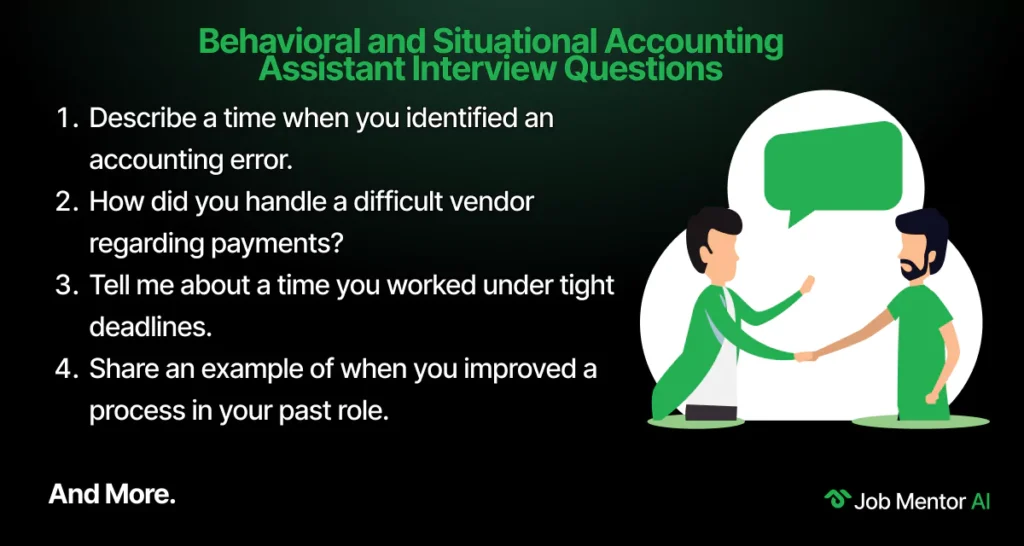
31. Describe a time when you identified an accounting error.
In my previous role, while reconciling accounts, I noticed a duplicate invoice had been posted, causing an overpayment risk. I immediately investigated the ledger, verified the supporting documents, and identified the vendor’s duplicate submission. I informed my supervisor, corrected the entry, and implemented a verification step in our process to prevent future duplicates. This not only corrected the error but also improved accuracy in daily accounting tasks.
32. How did you handle a difficult vendor regarding payments?
A vendor once contacted me aggressively about a delayed payment. I calmly reviewed the transaction records, identified that the delay was due to a missing approval, and communicated the issue transparently to the vendor. I then expedited internal approvals and ensured payment was processed within 24 hours. Following up with a confirmation and apology maintained a professional relationship while resolving the conflict efficiently.
33. Tell me about a time you worked under tight deadlines.
During the month-end closing, we faced a situation where several invoices were pending verification, and management required the reports urgently. I prioritized tasks, coordinated with colleagues to gather missing documentation, and double-checked all reconciliations. By maintaining focus and a structured workflow, I completed the reports accurately within the deadline, earning recognition for both speed and accuracy.
34. Share an example of when you improved a process in your past role.
I noticed that manual invoice entry was causing frequent errors and delays. I suggested implementing a batch upload system in our accounting software and trained the team on its usage. This change reduced data entry errors by 30% and cut processing time in half, significantly improving workflow efficiency.
35. How do you manage stress during financial closing periods?
I manage stress by staying organized, maintaining a detailed checklist, and breaking large tasks into manageable steps. During high-pressure periods, I focus on one task at a time and communicate proactively with team members to avoid bottlenecks. Regular short breaks and maintaining perspective also help me remain calm and productive, ensuring accuracy even under tight deadlines.
36. Describe a time when you had to work with limited information.
While preparing a financial report, I discovered that some supporting documents were missing due to delayed vendor submissions. I reviewed available data, used estimates based on prior periods, and flagged assumptions clearly in the report. I then coordinated with vendors to update the records. The report was completed on time with transparency about the limitations, which allowed management to make informed decisions.
37. How do you handle conflicts within a finance team?
In one instance, two team members disagreed on categorizing a set of transactions. I facilitated a discussion, encouraged each member to explain their reasoning, and referred to accounting policies to determine the correct classification. By maintaining a neutral and respectful approach, we resolved the conflict quickly and reached a consensus without affecting deadlines.
38. Tell me about a time when you exceeded expectations at work.
During a quarterly audit, I identified a recurring reconciliation error that had been overlooked for months. I corrected it, documented the solution, and recommended changes to internal processes to prevent recurrence. The auditors praised the initiative, and management implemented the new process, which improved overall accuracy in the finance department.
39. Have you ever disagreed with a supervisor about financial handling? What did you do?
I once disagreed with a supervisor on classifying an expense that could affect tax reporting. I calmly presented supporting documents, accounting standards, and potential implications. After discussing the matter, we reached a consensus that aligned with compliance requirements. By focusing on facts rather than opinions, I maintained a professional relationship and ensured accurate reporting.
40. How do you handle repetitive tasks while staying accurate?
I maintain accuracy in repetitive tasks by using checklists, automated tools, and regular breaks to stay focused. I also perform spot checks and reconcile data periodically to catch errors early. Creating a structured routine reduces fatigue and maintains high-quality output, even when performing monotonous accounting duties.
Performance-Based Accounting Assistant Interview Questions
This section of Accounting Assistant interview questions focuses on your efficiency, accuracy, and measurable contributions in your accounting role. Employers use these questions to understand how you deliver results, manage workloads, and improve processes while maintaining financial accuracy. It requires examples of productivity, error reduction, and meeting deadlines.
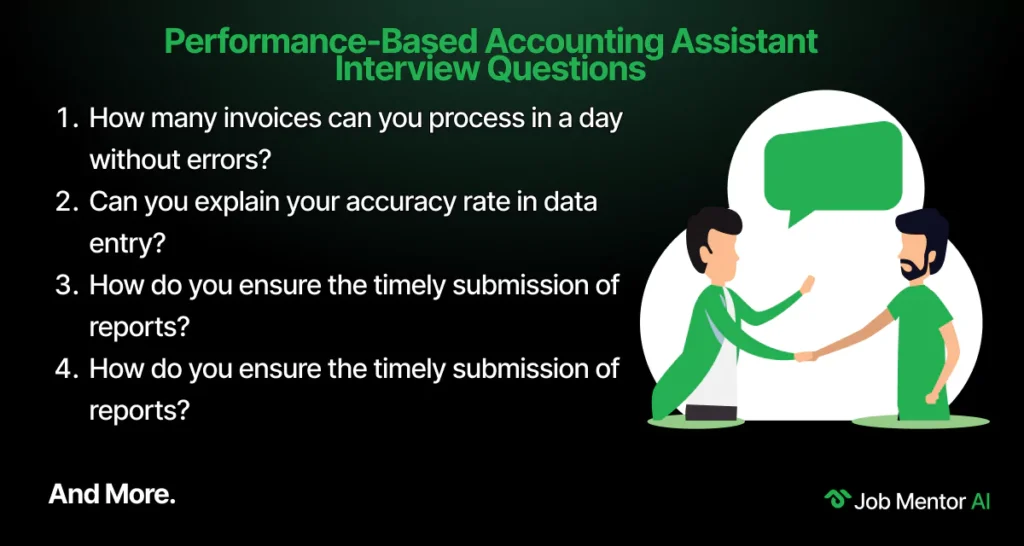
41. How many invoices can you process in a day without errors?
In my previous role, I consistently processed between 50–60 invoices per day with zero errors by implementing a structured workflow. I prioritized invoices based on due dates, double-checked supporting documents, and used accounting software to automate calculations. This approach ensured timely payments while maintaining accuracy, contributing to smoother vendor relationships and efficient cash flow management.
42. Can you explain your accuracy rate in data entry?
I maintain an accuracy rate of over 99% by carefully reviewing each entry, reconciling totals, and cross-referencing supporting documents. Additionally, I implement periodic spot checks and use validation tools in accounting software to catch discrepancies early. Consistently high accuracy ensures reliable financial reporting and reduces the need for corrective adjustments.
43. How do you ensure the timely submission of reports?
I ensure timely submission by planning tasks, prioritizing urgent reports, and setting internal deadlines ahead of official due dates. I also communicate proactively with colleagues to gather required data and use accounting software to streamline report generation. For example, during month-end closing, I prepared trial balances and reconciliations a few days in advance, which allowed ample time for review and submission.
44. What measures do you take to reduce financial discrepancies?
To minimize discrepancies, I reconcile accounts regularly, verify invoices against purchase orders, and review ledger entries daily. I also implement standardized templates and cross-check calculations using accounting software. In one instance, these measures helped reduce recurring invoice errors by 30%, ensuring more reliable financial data for management decisions.
45. Have you ever automated any accounting tasks?
Yes, I identified repetitive invoice entry as time-consuming and prone to errors, so I implemented a batch upload feature in our accounting software. This automation reduced manual work by 40% and significantly decreased mistakes. I also created automated reminders for pending payments, which improved cash flow management and enhanced overall team efficiency.
46. What’s your approach to handling overdue accounts?
For overdue accounts, I first review the aging report to prioritize collections. I then contact clients professionally to remind them of outstanding payments, offering payment options or negotiating timelines if necessary. Internally, I document all communications and follow up until the account is cleared. This structured approach maintains positive client relationships while ensuring the company receives timely payments.
47. How do you measure your performance as an Accounting Assistant?
I measure my performance using key indicators such as accuracy in data entry, number of invoices processed, timeliness of report submission, error reduction, and adherence to deadlines. I also track improvements in processes I implement, such as automation or reconciliations, and gather feedback from supervisors to assess effectiveness. Combining quantitative metrics with qualitative feedback ensures a comprehensive evaluation of my contribution.
48. Can you describe a time you improved team productivity?
I noticed our team spent excessive time manually reconciling accounts, which delayed the month-end closing. I suggested a standardized reconciliation template and trained colleagues to use it effectively. As a result, reconciliation time decreased by 25%, deadlines were met more consistently, and team stress was reduced. The process improvements became a standard practice for future periods.
49. How do you ensure compliance with deadlines?
I maintain a detailed calendar of tasks and deadlines, set reminders for critical milestones, and review progress regularly. For example, during quarterly reporting, I prepared preliminary drafts ahead of time, reconciled accounts early, and coordinated with colleagues to finalize the reports. This proactive approach ensures all deadlines are met without last-minute stress or errors.
50. What metrics do you track in daily accounting work?
I track metrics such as invoices processed, payments made, accounts receivable aging, reconciliation completion, error rates, and time taken for report preparation. Monitoring these metrics helps me identify bottlenecks, maintain accuracy, and continuously improve efficiency. Regular review of these indicators allows me to prioritize tasks effectively and provide reliable financial data to management.
Critical Thinking Accounting Assistant Interview Questions
This section of Accounting Assistant interview questions evaluates your ability to analyze financial situations, identify issues, and make informed decisions that impact the organization. Employers use these questions to see how you approach complex problems, resolve discrepancies, and optimize processes while maintaining accuracy and compliance.
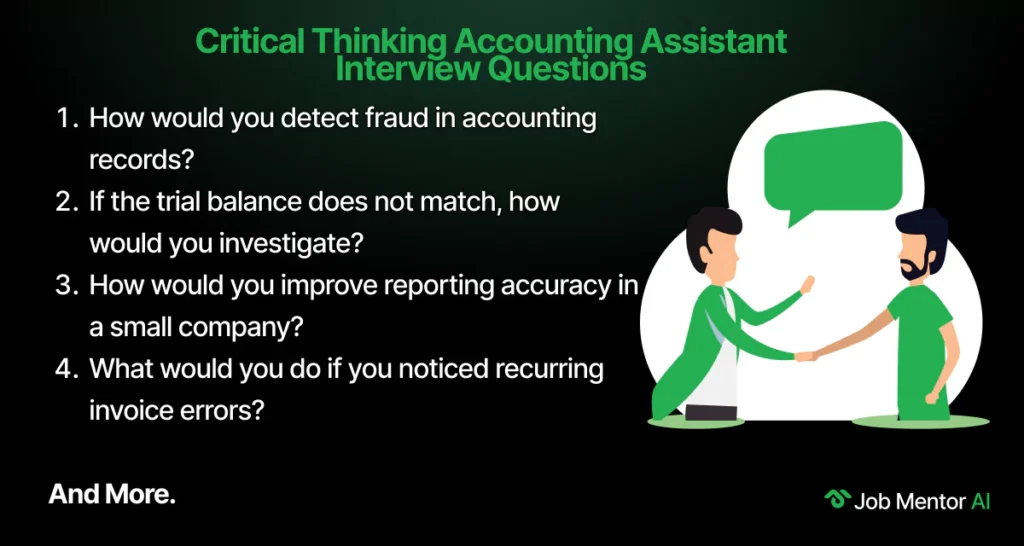
51. How would you detect fraud in accounting records?
I start by reviewing unusual or inconsistent transactions, such as duplicate payments, missing supporting documents, or sudden changes in account balances. I would reconcile accounts, cross-check vendor information, and examine authorization patterns. Any red flags would be escalated to management or auditors. In my previous role, implementing periodic random audits helped detect errors and prevent potential fraudulent activity.
52. If the trial balance does not match, how would you investigate?
Firstly, I verify that all transactions have been recorded correctly in the ledger. I’d check for posting errors, transposition mistakes, or omitted entries. Next, I would reconcile subsidiary ledgers with the general ledger to pinpoint discrepancies. If necessary, I would review source documents such as invoices, receipts, and bank statements. Systematic checking ensures that the imbalance is identified and corrected efficiently.
53. How would you improve reporting accuracy in a small company?
I will implement standardized templates for financial reports, establish clear workflows for data entry, and reconcile accounts regularly. Using accounting software to automate repetitive calculations reduces human error. Additionally, training staff on proper data handling and establishing internal review checks before finalizing reports ensures accuracy and reliability.
54. What would you do if you noticed recurring invoice errors?
I will analyze the pattern of errors to identify root causes, such as incorrect data entry, vendor issues, or system limitations. After identifying the cause, I will propose process improvements, such as verification steps, automation, or staff training. Regular monitoring would follow to ensure the errors are minimized or eliminated, maintaining accurate financial records.
55. How do you decide when to escalate an issue to management?
I escalate issues when they involve potential financial risk, non-compliance, fraud, or a problem beyond my authority to resolve. For instance, a significant discrepancy in accounts payable that could impact financial statements would be immediately reported. Clear documentation and a suggested course of action accompany the escalation to facilitate timely decision-making.
56. If given incomplete data, how would you prepare a financial report?
I use available information while clearly noting any assumptions or estimations made. I document the missing data, communicate with relevant departments to obtain it if possible, and ensure transparency in reporting. For example, if a vendor invoice is pending, I estimate data based on historical averages while highlighting it in the notes section. This approach allows management to make informed decisions despite data limitations.
57. How would you optimize vendor payment schedules to improve cash flow?
I will review upcoming payments, prioritize urgent invoices, and negotiate favorable payment terms with vendors. Grouping payments strategically and taking advantage of early payment discounts when cash flow allows can save money. Additionally, monitoring cash inflows ensures that essential payments are prioritized, maintaining both vendor relationships and optimal cash flow management.
58. What would you do if you suspected an employee was misusing company funds?
I discreetly review transaction records, approvals, and supporting documents to gather evidence. Any suspicious findings will be documented and escalated to management or internal audit for investigation, following company policies and maintaining confidentiality. Ensuring compliance and protecting the organization’s assets are the top priorities in such situations.
59. How would you decide between leasing vs. buying assets?
Factor
Leasing
Buying
Upfront Cost
Lower initial cash outlay
Higher initial investment
Ownership
No ownership; the asset is returned after the lease
Full ownership of the asset
Depreciation
Not applicable to the lessee
Recorded on the balance sheet, affects P&L over time
Flexibility
Easier to upgrade or replace
Asset is fixed; may require selling to replace
Tax Implications
Lease payments may be fully deductible
Depreciation can be claimed, and interest may be deductible
Long-Term Cost
May be higher over time due to repeated leases
Potentially lower if the asset is used long-term
Cash Flow Impact
Conserves cash and improves short-term liquidity
Large upfront outflow but no ongoing lease payments
Best For
Short-term use, rapidly changing technology
Long-term use, stable assets with predictable needs
60. How do you approach risk management in accounting?
I proactively identify areas where errors, fraud, or compliance issues could occur, such as accounts payable, receivables, or cash handling. I implement internal controls, regularly reconcile accounts, and review financial processes for vulnerabilities. Documenting procedures, training staff, and staying updated on regulations ensures that risks are mitigated while maintaining accurate and reliable financial reporting.
Career Growth Accounting Assistant Interview Questions
This section of Accounting Assistant interview questions assesses your ambition, willingness to learn, and long-term commitment to the accounting profession. Employers use these questions to understand how you plan to develop your skills, advance in your career, and contribute to the organization over time. Demonstrating
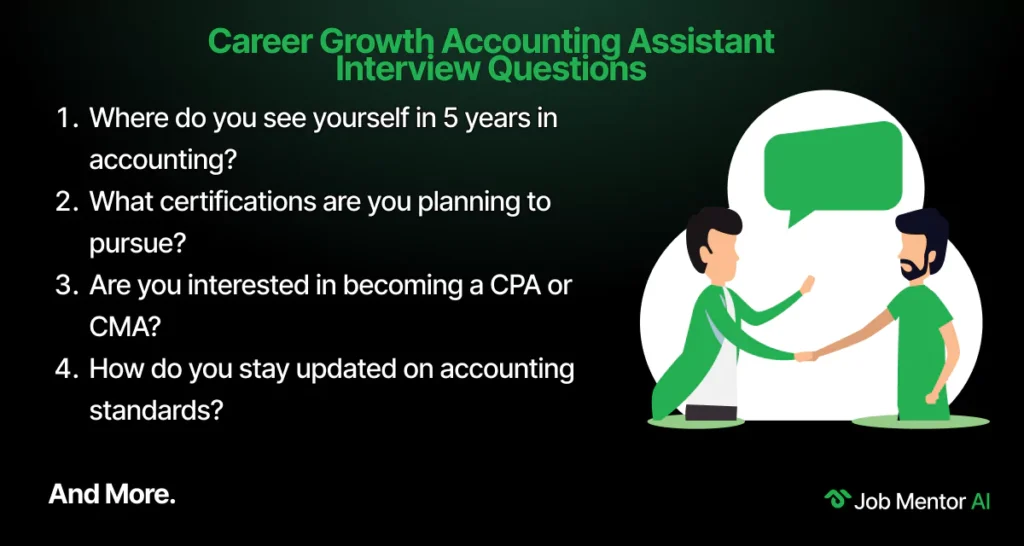
61. Where do you see yourself in 5 years in accounting?
In five years, I envision progressing into a senior accounting role or a position with supervisory responsibilities, such as Senior Accounting Assistant or Assistant Accountant. My goal is to develop advanced expertise in financial reporting, reconciliations, and compliance while contributing to process improvements. I plan to enhance my knowledge through certifications and on-the-job experience, positioning myself as a trusted finance professional who can support both day-to-day operations and strategic decision-making.
62. What certifications are you planning to pursue?
I am planning to pursue certifications such as CPA (Certified Public Accountant) or CMA (Certified Management Accountant) to deepen my technical knowledge and credibility. These certifications will allow me to gain expertise in financial reporting, auditing, taxation, and strategic management, which will enhance my ability to contribute effectively to the organization and prepare me for higher-level roles in finance.
63. Are you interested in becoming a CPA or CMA?
Yes, I am highly interested in pursuing a CPA or CMA designation. Both certifications provide a strong foundation in accounting principles, financial management, and ethical standards. Achieving one of these designations would not only expand my technical skillset but also open opportunities for advancement into leadership roles within the finance department.
64. How do you stay updated on accounting standards?
I stay updated by regularly reviewing professional publications, accounting journals, and official updates from standard-setting bodies such as FASB or IASB. I also attend webinars, workshops, and professional networking events to gain insights from industry experts. Staying informed ensures my work complies with current regulations and best practices, reducing errors and supporting accurate financial reporting.
65. What motivates you to grow in this career?
I am motivated by the opportunity to continuously learn, solve complex financial challenges, and contribute to the success of the organization. Seeing the tangible impact of accurate reporting, efficient processes, and strategic recommendations drives me to improve my skills and take on greater responsibilities. I also enjoy mentoring others and sharing knowledge, which contributes to both personal and team growth.
66. Do you see yourself moving into a managerial role?
Yes, I aspire to eventually move into a managerial role where I can lead a finance team, oversee processes, and support strategic decision-making. In preparation, I focus on strengthening my technical expertise, improving communication skills, and understanding workflow optimization. Gaining hands-on experience at each stage builds the foundation for effective leadership in finance.
67. How do you plan to improve your technical accounting skills?
I plan to improve my skills by combining formal education, such as certifications and specialized courses, with practical experience in accounting systems and reporting. Additionally, I regularly review case studies, attend workshops, and participate in internal projects that challenge me to apply advanced concepts. This continuous learning approach ensures that my skills remain current and relevant to evolving industry requirements.
68. What professional development courses have you completed?
I have completed courses in advanced Excel for finance, QuickBooks, financial analysis, and internal auditing. These courses enhanced my ability to analyze financial data efficiently, automate processes, and understand internal controls. I plan to continue pursuing additional courses in taxation, IFRS, and management accounting to strengthen my professional capabilities further.
69. How do you balance continuous learning with daily work?
I balance learning and work by setting aside dedicated time each week for skill development without compromising my daily responsibilities. I prioritize tasks, use time-management techniques, and apply what I learn immediately in my work. For example, after completing a course on automation tools, I implemented a process that reduced repetitive data entry tasks, benefiting both my productivity and the team’s efficiency.
70. Why should we invest in your long-term growth?
Investing in my long-term growth benefits the organization because I am committed to continuous learning, process improvement, and high-quality work. I strive to exceed expectations, contribute to efficiency, and stay updated on accounting standards and best practices. By supporting my professional development, the company gains a dedicated, knowledgeable, and adaptable finance professional capable of taking on greater responsibilities and driving positive impact over time.
Questions to Ask During an Accounting Assistant Interview
- What are the key responsibilities and priorities for this Accounting Assistant role in the first 6 months?
- How does the finance team collaborate with other departments, and what systems are in place to support workflow?
- What accounting software and tools does the company use, and are there opportunities for training on them?
- How does the organization support professional development and career growth for finance staff?
- Can you describe the company’s process for internal audits and month-end/year-end closings?
- What are the most common challenges an Accounting Assistant might face here, and how are they addressed?
- How is performance measured for Accounting Assistants, and what metrics are most valued?
Top 70 Accounting Assistant Interview Questions and Answers
Table of Contents
Recommended Resources

Top 30 Technical Program Management Interview Questions

Top 40 Digital Signal Processing Interview Questions

UI/UX Designer Interview Questions

Junior Product Manager Interview Questions

50 Must Know Cyber Security Interview Questions Answers

Top 30 Quality Analyst Interview Questions


